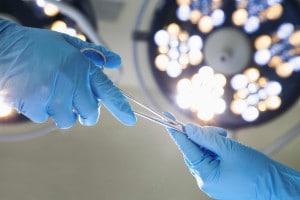Da Vinci Surgical System

Intuitive Surgical Inc., manufacturer and marketer of the da Vinci Surgical System, designed the robot in an effort to provide patients with a quicker, less painful surgical procedure. Use of the robot would reportedly lead to smaller incisions, quicker recovery periods, reduced blood loss, and less overall pain for the patient. However, Arkansas da Vinci lawsuit attorneys note that Intuitive has been facing claims from injured plaintiffs alleging that the da Vinci Surgical System is defective and that Intuitive failed to provide proper training to hospitals and surgeons before using the robot on live patients.
Background of the Da Vinci Surgical System
Unlike traditional surgical procedures, the da Vinci robot features a console at which the surgeon sits to perform the operation. Using joystick-like controls, the physician is able to guide the robot into the patient to complete the procedure. The robotic arms allegedly allow for greater mobility and a broader range of movement as the device is designed to mimic the human-like motion of arms and hands. After the surgeon successfully enters the patient, the robot provides a three-dimensional image so that the physician can see the entire area and perform the procedure with more accuracy.
Once the movements of the human were established, Intuitive used expensive technology to transform the motions into a robot. The system has become a phenomenon across the world, and over 2,000 hospitals, 1,300 of which are in the United States, use the robot. Intuitive also asserts that their product was used in over 450,000 procedures in 2012 alone.
Plaintiffs Allege Complications
However, Intuitive released a notification to physicians and the medical community in May 2013 acknowledging that the product may result in inadvertent patient harm. The letter drew attention to an accessory to the da Vinci Surgical System, the monopolar curved scissors, and acknowledged that the shears may develop cracks that can cause electricity to escape and jump around to other areas inside the patient’s body. These uncontrollable currents could lead to the inadvertent burning or cauterizing of otherwise healthy organs. While the manufacturer acknowledged the potential defects in the scissors, the company maintained that they had not received any direct evidence of patient injury. The notification was instead meant to be a precaution.
Arkansas da Vinci lawsuit attorneys note that injured patients are also claiming that physicians performing surgical procedures should have been better trained before attempting to operate the device. Intuitive acknowledges that they paid for two surgeons at each hospital to receive training for two days prior to operating the da Vinci robot. However, da Vinci lawsuit attorneys and plaintiffs alike allege that after that training period was over, it was then up to each individual hospital to decide how they wanted to proceed with additional training. In some cases, facilities took the matter seriously and required each surgeon to undergo extensive hours to ensure proper use of the device. At other locations, hospitals allegedly allowed physicians with little or no training to attempt to perform these procedures with little or no supervision.
Media outlet CNBC focused an entire segment on the da Vinci Surgical System and investigating the marketing tactics that the manufacturer used to promote the device. According to da Vinci lawsuit attorneys, the manufacturer allegedly misled, misrepresented or hid facts and potentially serious side effects from the public in an effort to boost their own sales and increase their stock value. Intuitive maintains that it did not act in such a way.
Yet, in one exchange between Intuitive’s sales director and sales leaders across the country, the former acknowledges that sales were down for the quarter. Arkansas da Vinci lawsuit attorneys and plaintiffs are alleging that these individuals acted out of necessity to ensure the rise of sales when they attempted to come up with various ways to increase earnings. Some claim to have persuaded facilities to use the robot instead of other traditional methods or to reduce the number of hours of training the hospital had previously required before allowing surgeons to perform procedures without supervision.
Arkansas da Vinci lawsuit attorneys note that sales leaders no longer employed by Intuitive also acknowledged that the company forced marketing tactics that were far from honest; persuasion to use Intuitive’s products and calling in favors to facilities were two of the alleged methods that the company used to boost their profits.
Have Questions? Contact Professional Arkansas Da Vinci Lawsuit Attorneys Today
If you, a friend or a family member has suffered from injuries during or following a da Vinci robot surgical procedure and you would like more information about filing a claim, contact Attorney Group for Arkansas today. We will help answer your and review your case to determine if you are eligible to pursue a claim. If we feel you may have a case, we will connect you with professional Arkansas da Vinci lawsuit attorneys who will be able to handle your claim. So contact Attorney Group for Arkansas today for your free consultation.





